Unit 1 When was it invented?复习课件(共53张PPT)
文档属性
| 名称 | Unit 1 When was it invented?复习课件(共53张PPT) | 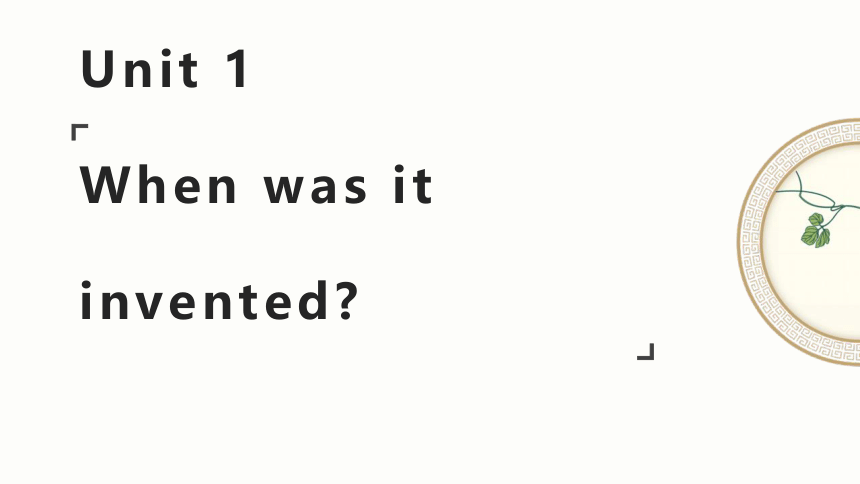 | |
| 格式 | pptx | ||
| 文件大小 | 1.4MB | ||
| 资源类型 | 教案 | ||
| 版本资源 | 鲁教版 | ||
| 科目 | 英语 | ||
| 更新时间 | 2023-09-16 08:06:56 | ||
图片预览

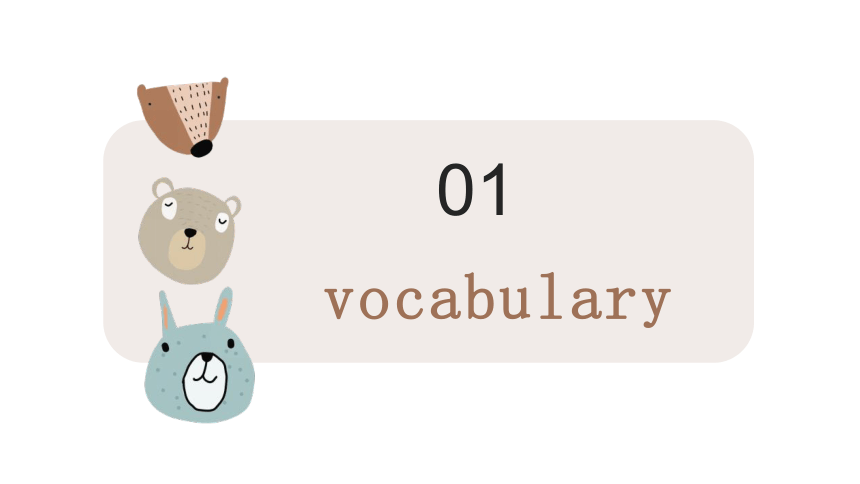
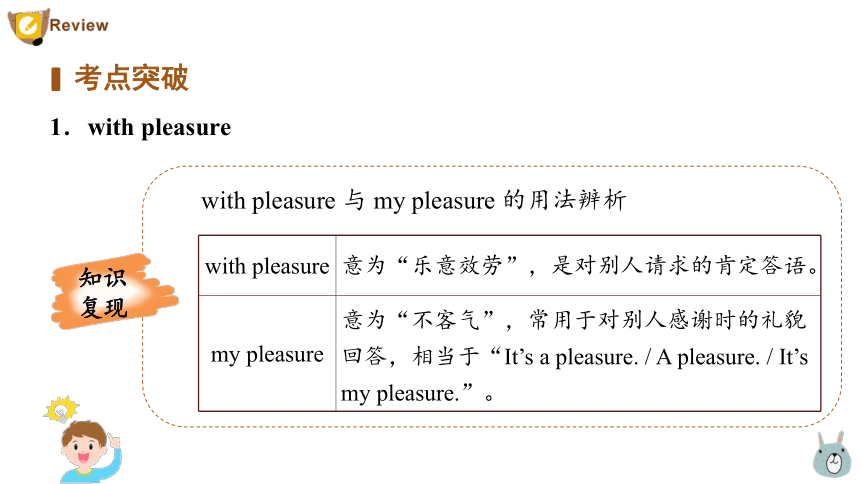
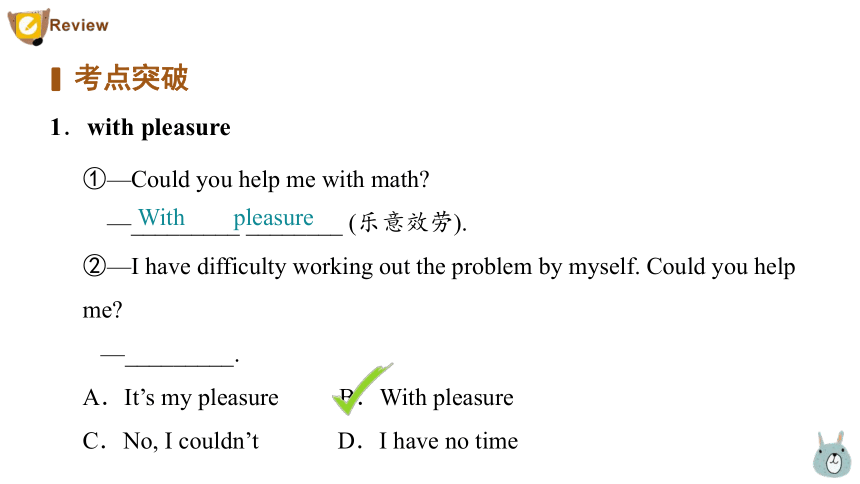
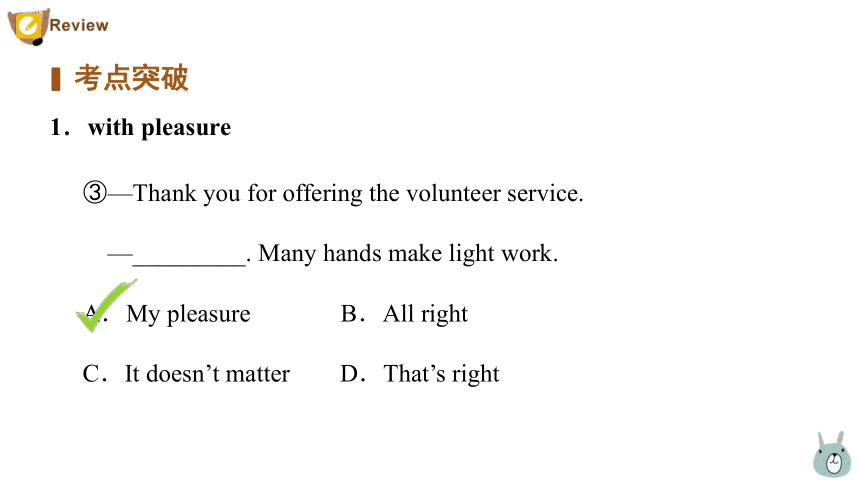
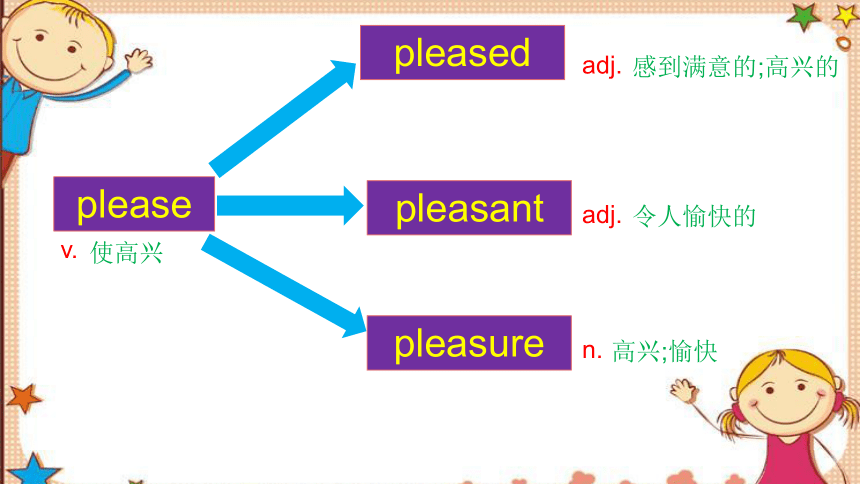
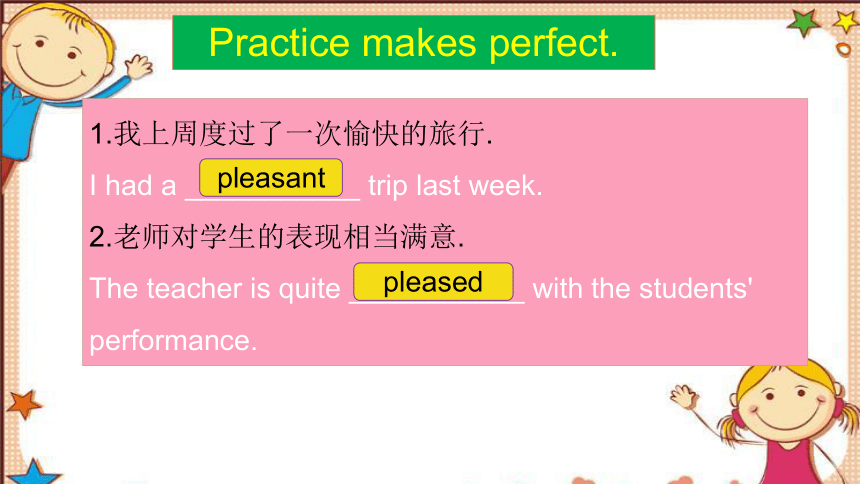
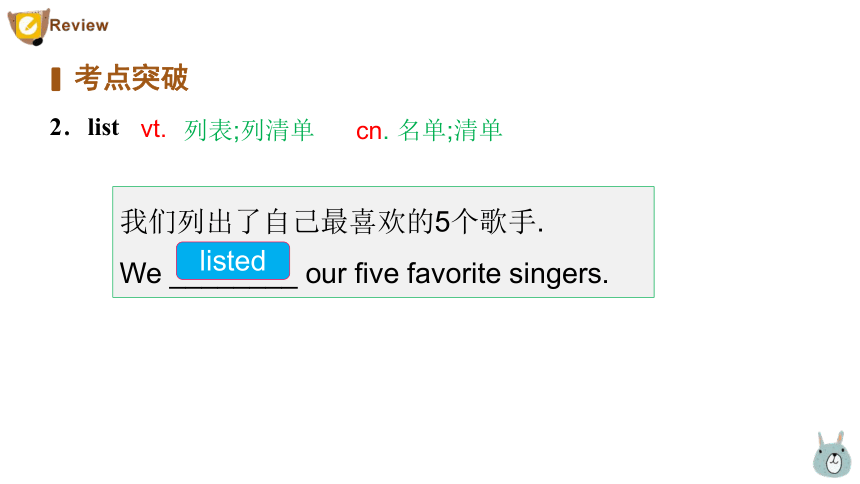

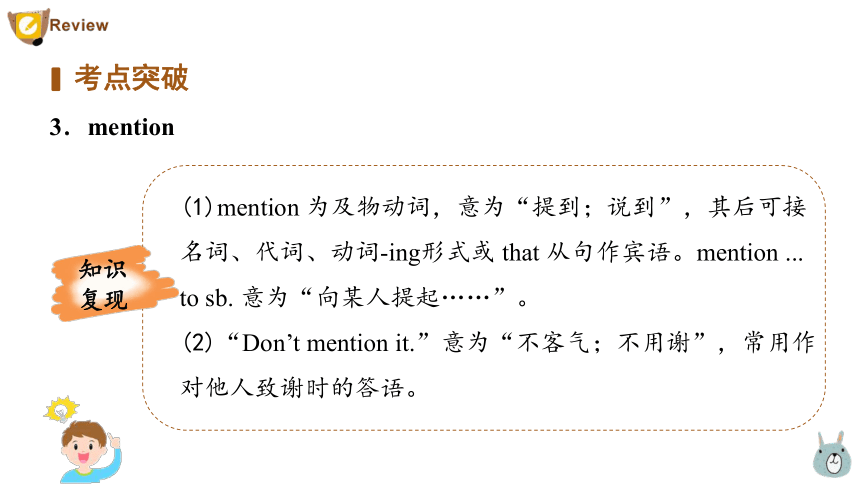
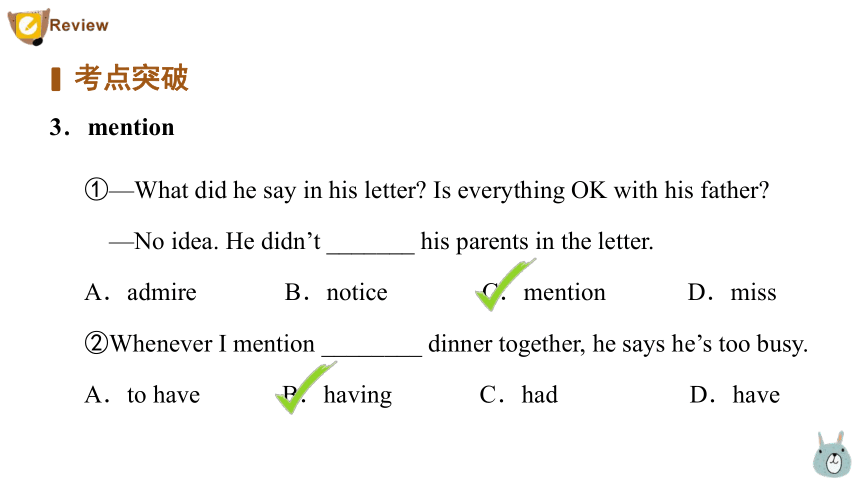
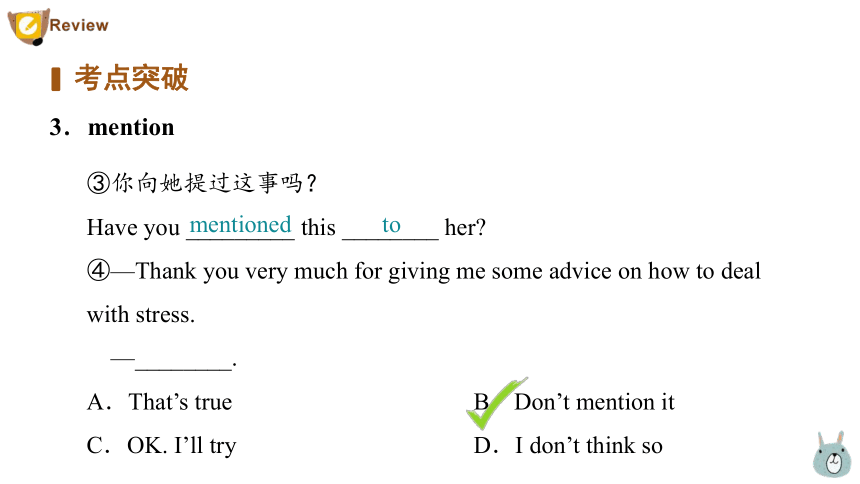
文档简介
(共53张PPT)
Unit 1
When was it invented
vocabulary
01
考点突破
1.with pleasure
知识复现
with pleasure 与 my pleasure 的用法辨析
with pleasure 意为“乐意效劳”,是对别人请求的肯定答语。
my pleasure 意为“不客气”,常用于对别人感谢时的礼貌回答,相当于“It’s a pleasure. / A pleasure. / It’s my pleasure.”。
①—Could you help me with math
—_________ ________ (乐意效劳).
②—I have difficulty working out the problem by myself. Could you help me
—_________.
A.It’s my pleasure B.With pleasure
C.No, I couldn’t D.I have no time
考点突破
1.with pleasure
With pleasure
③—Thank you for offering the volunteer service.
—_________. Many hands make light work.
A.My pleasure B.All right
C.It doesn’t matter D.That’s right
考点突破
1.with pleasure
Destiny工作室出品
13540016960
please
v.
使高兴
pleased
adj.
感到满意的;高兴的
pleasant
adj.
令人愉快的
pleasure
n.
高兴;愉快
Destiny工作室出品
13540016960
Practice makes perfect.
1.我上周度过了一次愉快的旅行.
I had a ___________ trip last week.
2.老师对学生的表现相当满意.
The teacher is quite ___________ with the students' performance.
pleasant
pleased
考点突破
2.list
我们列出了自己最喜欢的5个歌手.
We ________ our five favorite singers.
listed
vt.
列表;列清单
cn. 名单;清单
list还可作可数名词,意为“清单;名单”
a shopping list
a list of...
make a list of...
请把你必须做的所有事情列一个清单.
Please _______________ all the things you have to do.
make a list of
知识复现
(1)mention 为及物动词,意为“提到;说到”,其后可接名词、代词、动词-ing形式或 that 从句作宾语。mention ... to sb. 意为“向某人提起……”。
(2)“Don’t mention it.”意为“不客气;不用谢”,常用作对他人致谢时的答语。
考点突破
3.mention
①—What did he say in his letter Is everything OK with his father
—No idea. He didn’t _______ his parents in the letter.
A.admire B.notice C.mention D.miss
②Whenever I mention ________ dinner together, he says he’s too busy.
A.to have B.having C.had D.have
考点突破
3.mention
③你向她提过这事吗?
Have you _________ this ________ her
④—Thank you very much for giving me some advice on how to deal with stress.
—________.
A.That’s true B.Don’t mention it
C.OK. I’ll try D.I don’t think so
考点突破
3.mention
mentioned to
考点突破
4.It is said that ...
知识复现
(1)It is said that ... 意为“据说……”,其中 it 是形式主语,that 引导的从句为真正的主语。
(2)其他常见的“It is ... that”句式
known that
supposed that
believed that
reported that
It is
人们认为……
据报道……
众所周知……
据推测……
①________ is said that he has been to many countries.
A.This B.He C.It D.That
②—It has been raining for days. When will it stop
—It is _______ that the rainy season will be longer than last year.
A.says B.said C.saying D.to say
考点突破
4.It is said that ...
③人们认为茶在6世纪和7世纪期间被带到了日本。
________ ________ ________ that tea was brought to Japan during the 6th and 7th centuries.
考点突破
4.It is said that ...
It is believed
考点突破
5.remain
① “保持不变;仍然是(处于某种状态)”,相当于keep.后常接形容词,名词,分词或介词短语作表语.
1.他大多时候都保持沉默.
He _________________ most of the time.
2.他们进来时,她仍然在看电视.
She __________________ TV when they came in.
ramains silent
ramained watching
②“剩余”
火灾之后,这所房子所剩无几.
Very little of the house ___________ after the fire.
③“停留;逗留”,相当于stay
他整个下午都在办公室里.
He ___________ in his office all afternoon.
remained
remained
考点突破
6.smell
知识复现
(1)smell 用作名词,意为“气味”。
(2)smell 作系动词,意为“闻起来”,其后接形容词作表语。
(3)smell 还可以用作及物动词,意为“闻到”,其后接名词或代词。
①空气中充满了鲜花的气味。
The air was filled with ______ ______ of flowers.
②May I have some more chicken It ______ so delicious.
A.feels B.smells C.tastes D.sounds
③The fish you bought yesterday smells ______. You’d better throw it away.
A.good B.bad C.well D.badly
考点突破
6.smell
the smell
考点突破
7.trade
①作名词 “贸易;交易”
trade between...
trade in...
这两个国家之间的贸易增加了.
Trade between the two countries has increased.
②作动词 “做买卖;从事交易”
trade in sth (with sb)
这家公司从事茶叶,丝绸的贸易.
The company trades in tea and silk.
考点突破
8.popularity
the popularity of...
...普及
电子教科书的普及正在改变学生的学习方式.
_________________ E-textbooks is changing the way the students learn.
The popularity of
Destiny工作室出品
13540016960
popularity
n.
受欢迎;普及
popular
adj.
受欢迎的;普遍的
be popular with/among...
受到...的欢迎;在...中受欢迎
be popular as...
作为...而受欢迎
be popular for...
因...而受欢迎
周杰伦受到年轻人中很受欢迎.
Jay Chou _______________ young people.
is popular with
考点突破
9.take place/happen
知识复现
take place 与 happen 的用法辨析
take place 发生;出现;举行 表示必然性的“发生”,或指有计划有安排地“举行”,无被动语态。
happen 发生;碰巧 一般用于偶然性或突发性事件,无被动语态;“sth. + happen + to sb.”表示“某人发生/出了某事”。
①The 2024 Olympic Games will ________ in Paris.
A.happen B.hold C.take place D.be taken place
②在过去的几年里,我的家乡发生了巨大的变化。
Great changes ________ _______ _______ in my hometown in the past few years.
考点突破
9.take place/happen
have taken place
③事故是怎么发生的?
How ________ the accident ________
④今天上午她发生了交通事故。
A car accident _________ ______ ______ this morning.
考点突破
9.take place/happen
did happen
happened to her
考点突破
10.doubt
知识复现
(1)doubt 用作名词,意为“疑惑;疑问”。常用短语:without doubt意为“毫无疑问;的确”;no doubt意为“无疑;很可能”;there is no doubt that ... 意为“毫无疑问……”。
(2)doubt 用作动词,意为“怀疑;不相信”,其后可接名词、代词或从句作宾语。doubt 后接宾语从句时,如果主句为肯定句,宾语从句用 whether 或 if 引导;如果主句为否定句或疑问句,宾语从句用 that 引导或省略 that。
①当地铁一号线完成建设,旅客出行毫无疑问将会感到更加便捷。
When Subway Line 1 is completed, passengers will ________ ________ feel more convenient to travel around.
②毫无疑问我们做得对。
________ ________ ________ ________ that we did the right thing.
③I never doubted ________ she would come.
A.if B.whether C.that D.how
考点突破
10.doubt
without doubt
There is no doubt
考点突破
11.stop ... (from) doing sth.
知识复现
(1)stop ... (from) doing sth. 意为“阻止……做某事”,相当于 prevent ... (from) doing sth.,在主动语态中两者中的 from 均可以省略,但在被动语态中不能省略。
(2)keep ... from doing sth. 也可以表达类似的意思,其中 from无论在主动语态还是在被动语态中均不能省略。
①The Great Green Wall can stop the wind and sand ________ to the rich land in the south of China.
A.to move B.to moving C.from moving D.from move
②—Trees can stop the wind ________ the earth away.
—So it’s good for us to plant more trees.
A.blow B.blowing C.to blow D.blows
考点突破
11.stop ... (from) doing sth.
③大雨让他无法回家。
The heavy rain ________ him ________ ________ home.
=The heavy rain _________ him ________ ________ home.
=The heavy rain ________ him ________ ________ home.
考点突破
11.stop ... (from) doing sth.
stopped from going
prevented from going
kept from going
考点突破
12.not only ... but also ...
知识复现
(1)not only ... but also ... 意为“不但……而且……”,为并列连词,连接两个并列成分,其中 also 可以省略。
(2)not only ... but also ... 连接两个并列名词或代词作主语时,谓语动词在人称和数上要与 but also 之后的主语保持一致,即遵循“就近一致”原则。
①迈克不仅帅气而且聪明。
Mike is ________ ________ handsome ________ ________ clever.
②—Which show do you prefer, Keep Running or The Reader
—The Reader, of course. ________ I ________ my brother likes it.
A.Both; and B.Neither; nor C.Either; or D.Not only; but also
考点突破
12.not only ... but also ...
not only but also
③—Do you like your new T-shirt
—Yes, not only I but also my brother________ it.
A.like B.likes C.liked D.liking
考点突破
12.not only ... but also ...
考点突破
13.translate
translate...into...
把...翻译成...
1.这篇文章不好翻译.
It's difficult to ___________ the passage.
2.他把这本书翻译成了英文.
He ___________ the book ______ English.
translate
translated
into
translate
vt.
翻译
translator
n.
翻译家;译者
translation
n.
翻译;译文
1.虽然这翻译并不尽善尽美,但他已尽力而为了.
Although the ___________ is not perfect, he did it to the best of his ability.
2.我想成为一名优秀的翻译家.
I want to be an excellent ____________.
translation
translator
考点突破
14.divide
divide ... into ...
把...分开
被动结构为:be divided into...
...被分为...
一年有四季并且被分成了12个月.
One year has four seasons and it _______________ twelve months.
is divided into
Grammar
02
一般过去时的被动语态
一般过去时的被动语态
语法突破
知识复现
(1)概念:
一般过去时的被动语态表示过去某一时间的被动动作或过去经常性、习惯性的被动动作。
(2)构成:was/were + 及物动词的过去分词
一般过去时的被动语态
语法突破
知识复现
(3)句式结构:
肯定句 主语 + was/were + 及物动词的过去分词(+ by ...).
否定句 主语 + was/were + not + 及物动词的过去分词(+ by ...).
一般疑问句 Was/Were + 主语 + 及物动词的过去分词(+ by ...).
特殊疑问句 疑问词 + was/were + 主语 + 及物动词的过去分词(+ by ...)
①—Why didn’t you come to Jenny’s birthday party yesterday
—Because I ________.
A.didn’t invite B.isn’t invited
C.wasn’t invited D.haven’t invited
②Lucy invited Mary to her birthday party this morning. (改为被动语态)
Mary ________ ________ ________ Lucy’s birthday party this morning.
语法突破
一般过去时的被动语态
was invited to
③The telephone was invented in 1876. (对画线部分提问)
________ ________ the telephone ________
④The room was cleaned by Tom. (对画线部分提问)
________ ________ the room cleaned ________
语法突破
一般过去时的被动语态
When was invented
Who was by
practice
03
1.The Olympic Games of 2024 will _________ in Paris.
A.take after B.take off C.take place D.take away
2.The students ________ two groups to play the game yesterday afternoon.
A.are divided among B.are divided into
C.were divided among D.were divided into
3.The plane on the ground for two more hours because of the bad weather..
A.ran B.moved C.shook D.remained
C
D
D
4.Our teacher ________ carefully.
A.should be listened to B.should be listen C.be listened D.is listened
5.My advice on how to save paper______ by my class last Monday.
A.accepts B.accepted C.was accepted D.is accepted
6.Franklin ________ electricity, and Edison ________ the light bulb.
A.discovered; discovered B.invented; invented
C.discovered; invented D.invented; discovered
A
C
C
7. He is an honest boy. I have no reason to _______ what he said.
A.hear B.doubt C.repeat D.believe
8.----Jim, how do your parents like country music
----_____ my dad _____ my mom likes it. They both like country music.
A.Either, or B.Neither, nor C.Not only, but also D.Both, and
B
C
9.The workers were made____from morning to night in the past.
A.worked B.to work C.work D.working
10.—Sorry, Jean, I took your camera ________.
—It doesn't matter. Be careful next time.
A.by accident B.by the way
C.by mistake D.by hand
B
C
Cars were invented in the last century. Today they have 11 the lives of everyone in the United States. Most Americans feel that they are poor when they have 12 cars.
Why are cars 13 used in the United States?Here are three reasons.
First of all, the country is very large and Americans enjoy 14 trips here and there. With 15 they can go anywhere easily.
The second reason is 16 trains have never been as common in the United States as they are in other parts of the world. What’s 17 , Americans have to spend a lot of money traveling by plane.
The third 18 is the most important one. Americans don't like to 19 buses or trains or even planes. They like cars 20 they want to travel fast at any time.
11.A.saved B.touched C.made D.done
12.A.no B.some C.many D.now
13.A.wide B.wider C.widest D.widely
14.A.to have B.taking C.to make D.takes
15.A.cars B.buses C.trains D.planes
16.A.why B.where C.that D.there
17.A.more B.that C.so D.most
18.A.thing B.excuse C.matter D.reason
19.A.wait for B.work for C.work on D.wait on
20.A.because B.before C.after D.so
B
A
D
B
A
C
A
D
A
A
21.We were surprised because he didn't ________ (提到) Lisa's absence.
22.Mr. Wang often ________ (划分) the class into five groups to practice English.
23.Potato chips were invented by ________(错误).
24.The young man saved the child. And we think he is a __(英雄).
25.There are lots of _________ (顾客) in the supermarket at the weekend.
mention
divides
mistake
hero
customers
26.Every country has its own ________ (民族的) culture.
27.Remember to ________ (锁上) the door when you leave the room.
28.I bought the shirt because I liked the ________ (款式) of it very much.
29.Without ________ (怀疑), we can finish the task on time.
30.You'd better put the meat into the ________(冰箱), or it will go bad.
national
lock
style
doubt
fridge
好好学习
天天向上
Unit 1
When was it invented
vocabulary
01
考点突破
1.with pleasure
知识复现
with pleasure 与 my pleasure 的用法辨析
with pleasure 意为“乐意效劳”,是对别人请求的肯定答语。
my pleasure 意为“不客气”,常用于对别人感谢时的礼貌回答,相当于“It’s a pleasure. / A pleasure. / It’s my pleasure.”。
①—Could you help me with math
—_________ ________ (乐意效劳).
②—I have difficulty working out the problem by myself. Could you help me
—_________.
A.It’s my pleasure B.With pleasure
C.No, I couldn’t D.I have no time
考点突破
1.with pleasure
With pleasure
③—Thank you for offering the volunteer service.
—_________. Many hands make light work.
A.My pleasure B.All right
C.It doesn’t matter D.That’s right
考点突破
1.with pleasure
Destiny工作室出品
13540016960
please
v.
使高兴
pleased
adj.
感到满意的;高兴的
pleasant
adj.
令人愉快的
pleasure
n.
高兴;愉快
Destiny工作室出品
13540016960
Practice makes perfect.
1.我上周度过了一次愉快的旅行.
I had a ___________ trip last week.
2.老师对学生的表现相当满意.
The teacher is quite ___________ with the students' performance.
pleasant
pleased
考点突破
2.list
我们列出了自己最喜欢的5个歌手.
We ________ our five favorite singers.
listed
vt.
列表;列清单
cn. 名单;清单
list还可作可数名词,意为“清单;名单”
a shopping list
a list of...
make a list of...
请把你必须做的所有事情列一个清单.
Please _______________ all the things you have to do.
make a list of
知识复现
(1)mention 为及物动词,意为“提到;说到”,其后可接名词、代词、动词-ing形式或 that 从句作宾语。mention ... to sb. 意为“向某人提起……”。
(2)“Don’t mention it.”意为“不客气;不用谢”,常用作对他人致谢时的答语。
考点突破
3.mention
①—What did he say in his letter Is everything OK with his father
—No idea. He didn’t _______ his parents in the letter.
A.admire B.notice C.mention D.miss
②Whenever I mention ________ dinner together, he says he’s too busy.
A.to have B.having C.had D.have
考点突破
3.mention
③你向她提过这事吗?
Have you _________ this ________ her
④—Thank you very much for giving me some advice on how to deal with stress.
—________.
A.That’s true B.Don’t mention it
C.OK. I’ll try D.I don’t think so
考点突破
3.mention
mentioned to
考点突破
4.It is said that ...
知识复现
(1)It is said that ... 意为“据说……”,其中 it 是形式主语,that 引导的从句为真正的主语。
(2)其他常见的“It is ... that”句式
known that
supposed that
believed that
reported that
It is
人们认为……
据报道……
众所周知……
据推测……
①________ is said that he has been to many countries.
A.This B.He C.It D.That
②—It has been raining for days. When will it stop
—It is _______ that the rainy season will be longer than last year.
A.says B.said C.saying D.to say
考点突破
4.It is said that ...
③人们认为茶在6世纪和7世纪期间被带到了日本。
________ ________ ________ that tea was brought to Japan during the 6th and 7th centuries.
考点突破
4.It is said that ...
It is believed
考点突破
5.remain
① “保持不变;仍然是(处于某种状态)”,相当于keep.后常接形容词,名词,分词或介词短语作表语.
1.他大多时候都保持沉默.
He _________________ most of the time.
2.他们进来时,她仍然在看电视.
She __________________ TV when they came in.
ramains silent
ramained watching
②“剩余”
火灾之后,这所房子所剩无几.
Very little of the house ___________ after the fire.
③“停留;逗留”,相当于stay
他整个下午都在办公室里.
He ___________ in his office all afternoon.
remained
remained
考点突破
6.smell
知识复现
(1)smell 用作名词,意为“气味”。
(2)smell 作系动词,意为“闻起来”,其后接形容词作表语。
(3)smell 还可以用作及物动词,意为“闻到”,其后接名词或代词。
①空气中充满了鲜花的气味。
The air was filled with ______ ______ of flowers.
②May I have some more chicken It ______ so delicious.
A.feels B.smells C.tastes D.sounds
③The fish you bought yesterday smells ______. You’d better throw it away.
A.good B.bad C.well D.badly
考点突破
6.smell
the smell
考点突破
7.trade
①作名词 “贸易;交易”
trade between...
trade in...
这两个国家之间的贸易增加了.
Trade between the two countries has increased.
②作动词 “做买卖;从事交易”
trade in sth (with sb)
这家公司从事茶叶,丝绸的贸易.
The company trades in tea and silk.
考点突破
8.popularity
the popularity of...
...普及
电子教科书的普及正在改变学生的学习方式.
_________________ E-textbooks is changing the way the students learn.
The popularity of
Destiny工作室出品
13540016960
popularity
n.
受欢迎;普及
popular
adj.
受欢迎的;普遍的
be popular with/among...
受到...的欢迎;在...中受欢迎
be popular as...
作为...而受欢迎
be popular for...
因...而受欢迎
周杰伦受到年轻人中很受欢迎.
Jay Chou _______________ young people.
is popular with
考点突破
9.take place/happen
知识复现
take place 与 happen 的用法辨析
take place 发生;出现;举行 表示必然性的“发生”,或指有计划有安排地“举行”,无被动语态。
happen 发生;碰巧 一般用于偶然性或突发性事件,无被动语态;“sth. + happen + to sb.”表示“某人发生/出了某事”。
①The 2024 Olympic Games will ________ in Paris.
A.happen B.hold C.take place D.be taken place
②在过去的几年里,我的家乡发生了巨大的变化。
Great changes ________ _______ _______ in my hometown in the past few years.
考点突破
9.take place/happen
have taken place
③事故是怎么发生的?
How ________ the accident ________
④今天上午她发生了交通事故。
A car accident _________ ______ ______ this morning.
考点突破
9.take place/happen
did happen
happened to her
考点突破
10.doubt
知识复现
(1)doubt 用作名词,意为“疑惑;疑问”。常用短语:without doubt意为“毫无疑问;的确”;no doubt意为“无疑;很可能”;there is no doubt that ... 意为“毫无疑问……”。
(2)doubt 用作动词,意为“怀疑;不相信”,其后可接名词、代词或从句作宾语。doubt 后接宾语从句时,如果主句为肯定句,宾语从句用 whether 或 if 引导;如果主句为否定句或疑问句,宾语从句用 that 引导或省略 that。
①当地铁一号线完成建设,旅客出行毫无疑问将会感到更加便捷。
When Subway Line 1 is completed, passengers will ________ ________ feel more convenient to travel around.
②毫无疑问我们做得对。
________ ________ ________ ________ that we did the right thing.
③I never doubted ________ she would come.
A.if B.whether C.that D.how
考点突破
10.doubt
without doubt
There is no doubt
考点突破
11.stop ... (from) doing sth.
知识复现
(1)stop ... (from) doing sth. 意为“阻止……做某事”,相当于 prevent ... (from) doing sth.,在主动语态中两者中的 from 均可以省略,但在被动语态中不能省略。
(2)keep ... from doing sth. 也可以表达类似的意思,其中 from无论在主动语态还是在被动语态中均不能省略。
①The Great Green Wall can stop the wind and sand ________ to the rich land in the south of China.
A.to move B.to moving C.from moving D.from move
②—Trees can stop the wind ________ the earth away.
—So it’s good for us to plant more trees.
A.blow B.blowing C.to blow D.blows
考点突破
11.stop ... (from) doing sth.
③大雨让他无法回家。
The heavy rain ________ him ________ ________ home.
=The heavy rain _________ him ________ ________ home.
=The heavy rain ________ him ________ ________ home.
考点突破
11.stop ... (from) doing sth.
stopped from going
prevented from going
kept from going
考点突破
12.not only ... but also ...
知识复现
(1)not only ... but also ... 意为“不但……而且……”,为并列连词,连接两个并列成分,其中 also 可以省略。
(2)not only ... but also ... 连接两个并列名词或代词作主语时,谓语动词在人称和数上要与 but also 之后的主语保持一致,即遵循“就近一致”原则。
①迈克不仅帅气而且聪明。
Mike is ________ ________ handsome ________ ________ clever.
②—Which show do you prefer, Keep Running or The Reader
—The Reader, of course. ________ I ________ my brother likes it.
A.Both; and B.Neither; nor C.Either; or D.Not only; but also
考点突破
12.not only ... but also ...
not only but also
③—Do you like your new T-shirt
—Yes, not only I but also my brother________ it.
A.like B.likes C.liked D.liking
考点突破
12.not only ... but also ...
考点突破
13.translate
translate...into...
把...翻译成...
1.这篇文章不好翻译.
It's difficult to ___________ the passage.
2.他把这本书翻译成了英文.
He ___________ the book ______ English.
translate
translated
into
translate
vt.
翻译
translator
n.
翻译家;译者
translation
n.
翻译;译文
1.虽然这翻译并不尽善尽美,但他已尽力而为了.
Although the ___________ is not perfect, he did it to the best of his ability.
2.我想成为一名优秀的翻译家.
I want to be an excellent ____________.
translation
translator
考点突破
14.divide
divide ... into ...
把...分开
被动结构为:be divided into...
...被分为...
一年有四季并且被分成了12个月.
One year has four seasons and it _______________ twelve months.
is divided into
Grammar
02
一般过去时的被动语态
一般过去时的被动语态
语法突破
知识复现
(1)概念:
一般过去时的被动语态表示过去某一时间的被动动作或过去经常性、习惯性的被动动作。
(2)构成:was/were + 及物动词的过去分词
一般过去时的被动语态
语法突破
知识复现
(3)句式结构:
肯定句 主语 + was/were + 及物动词的过去分词(+ by ...).
否定句 主语 + was/were + not + 及物动词的过去分词(+ by ...).
一般疑问句 Was/Were + 主语 + 及物动词的过去分词(+ by ...).
特殊疑问句 疑问词 + was/were + 主语 + 及物动词的过去分词(+ by ...)
①—Why didn’t you come to Jenny’s birthday party yesterday
—Because I ________.
A.didn’t invite B.isn’t invited
C.wasn’t invited D.haven’t invited
②Lucy invited Mary to her birthday party this morning. (改为被动语态)
Mary ________ ________ ________ Lucy’s birthday party this morning.
语法突破
一般过去时的被动语态
was invited to
③The telephone was invented in 1876. (对画线部分提问)
________ ________ the telephone ________
④The room was cleaned by Tom. (对画线部分提问)
________ ________ the room cleaned ________
语法突破
一般过去时的被动语态
When was invented
Who was by
practice
03
1.The Olympic Games of 2024 will _________ in Paris.
A.take after B.take off C.take place D.take away
2.The students ________ two groups to play the game yesterday afternoon.
A.are divided among B.are divided into
C.were divided among D.were divided into
3.The plane on the ground for two more hours because of the bad weather..
A.ran B.moved C.shook D.remained
C
D
D
4.Our teacher ________ carefully.
A.should be listened to B.should be listen C.be listened D.is listened
5.My advice on how to save paper______ by my class last Monday.
A.accepts B.accepted C.was accepted D.is accepted
6.Franklin ________ electricity, and Edison ________ the light bulb.
A.discovered; discovered B.invented; invented
C.discovered; invented D.invented; discovered
A
C
C
7. He is an honest boy. I have no reason to _______ what he said.
A.hear B.doubt C.repeat D.believe
8.----Jim, how do your parents like country music
----_____ my dad _____ my mom likes it. They both like country music.
A.Either, or B.Neither, nor C.Not only, but also D.Both, and
B
C
9.The workers were made____from morning to night in the past.
A.worked B.to work C.work D.working
10.—Sorry, Jean, I took your camera ________.
—It doesn't matter. Be careful next time.
A.by accident B.by the way
C.by mistake D.by hand
B
C
Cars were invented in the last century. Today they have 11 the lives of everyone in the United States. Most Americans feel that they are poor when they have 12 cars.
Why are cars 13 used in the United States?Here are three reasons.
First of all, the country is very large and Americans enjoy 14 trips here and there. With 15 they can go anywhere easily.
The second reason is 16 trains have never been as common in the United States as they are in other parts of the world. What’s 17 , Americans have to spend a lot of money traveling by plane.
The third 18 is the most important one. Americans don't like to 19 buses or trains or even planes. They like cars 20 they want to travel fast at any time.
11.A.saved B.touched C.made D.done
12.A.no B.some C.many D.now
13.A.wide B.wider C.widest D.widely
14.A.to have B.taking C.to make D.takes
15.A.cars B.buses C.trains D.planes
16.A.why B.where C.that D.there
17.A.more B.that C.so D.most
18.A.thing B.excuse C.matter D.reason
19.A.wait for B.work for C.work on D.wait on
20.A.because B.before C.after D.so
B
A
D
B
A
C
A
D
A
A
21.We were surprised because he didn't ________ (提到) Lisa's absence.
22.Mr. Wang often ________ (划分) the class into five groups to practice English.
23.Potato chips were invented by ________(错误).
24.The young man saved the child. And we think he is a __(英雄).
25.There are lots of _________ (顾客) in the supermarket at the weekend.
mention
divides
mistake
hero
customers
26.Every country has its own ________ (民族的) culture.
27.Remember to ________ (锁上) the door when you leave the room.
28.I bought the shirt because I liked the ________ (款式) of it very much.
29.Without ________ (怀疑), we can finish the task on time.
30.You'd better put the meat into the ________(冰箱), or it will go bad.
national
lock
style
doubt
fridge
好好学习
天天向上
同课章节目录
- Unit 1 When was it invented?
- Section A
- Section B
- Unit 2 Teenagers should be allowed to choose their
- Section A
- Section B
- Unit 3 It must belong to Carla.
- Section A
- Section B
- Unit 4 I like music that I can dance to.
- Section A
- Section B
- Unit 5 You’re supposed to shake hands.
- Section A
- Section B
- Unit 6 Sad movies make me cry.
- Section A
- Section B
- Unit 7 Life is full of the unexpected.
- Section A
- Section B
- Unit 8 We're trying to save the earth!
- Section A
- Section B
- Unit 9 It's important to have good habits.
- Section A
- Section B
- Unit 10 I remember meeting all of you in Grade 6.
- Section A
- Section B
